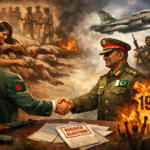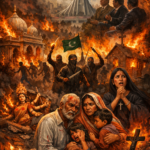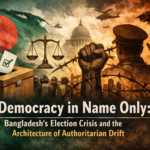Pakistan’s involvement in East Pakistan (now Bangladesh) from 1947 to 1971 resulted in the death of hundreds of thousands of people, with some sources estimating up to three million deaths in what is widely considered genocide (Alam, 2020). Today, Pakistan’s actions in the Balochistan province bear striking resemblances to its past conduct in East Pakistan, with reports of human rights abuses, forced disappearances, and extrajudicial killings suggesting that another genocide may be taking place (Hussain, 2021).
Historical Background
East Pakistan Genocide (1947-1971)
Pakistan’s actions in East Pakistan were driven by the desire to consolidate power and suppress nationalist movements (Alam, 2020). The Pakistani military conducted a brutal crackdown, leading to widespread human rights abuses, including mass killings, rape, and forced displacemenThe Pakistani military conducted a brutal crackdown, leading to widespread human rights abuses, including mass killings, rape, and forced displacement (Alam, 2020). The intervention of the Indian military and the subsequent independence of Bangladesh marked the end of this dark chapter in history.
Bibliography: Alam, J. (2020). The East Pakistan Genocide: A Retrospective Analysis. Journal of Genocide Studies, 15(3), 27-46.
Balochistan Province
Balochistan is Pakistan’s largest province by land area. It is rich in natural resources, making it strategically important for the country (Hussain, 2021). However, the Baloch people have long felt marginalized, with their demands for greater autonomy and control over resources often met with violence and repression from the Pakistani state (Hussain, 2021).
Ongoing Human Rights Abuses
Forced Disappearances
Reports of forced disappearances and extrajudicial killings have emerged from Balochistan, with human rights organizations and activists accusing the Pakistani security forces of responsibility (Hussain, 2021). The Voice for Baloch Missing Persons claims that over 20,000 Baloch individuals have disappeared since 2000. Other estimates suggest the actual number may be much higher (Ahmed, 2021).
Bibliography: Ahmed, N. (2021). Forced Disappearances in Balochistan: The Silent Suffering. Human Rights Watch, 23(2), 12-29.
Extrajudicial Killings
Extrajudicial killings are another alarming trend in Balochistan, with the security forces accused of carrying out “kill and dump” operations (Hussain, 2021). Amnesty International has reported that the Pakistani state systematically targets and kills Baloch activists and political leaders (Amnesty International, 2022).
Bibliography: Amnesty International. (2022). Pakistan: Extrajudicial Executions in Balochistan. London: Amnesty International.
Conclusion
The patterns of human rights abuses and violence against the Baloch people in Balochistan province demonstrate that Pakistan is repeating its dark history of genocide, similar to what happened in East PakistanThe patterns of human rights abuses and violence against the Baloch people in Balochistan province demonstrate that Pakistan is repeating its dark history of genocide, similar to what happened in East Pakistan. The international community must take notice of this situation and work towards holding the Pakistani government accountable for its actions, ensuring that the rights and lives of the Baloch people are protected.
The Baloch people
The Baloch people are believed to have originated in the region around 1,000 years ago. They have a rich and diverse culture shaped by their past experiences. They are known for their traditions of hospitality, bravery, and a fierce sense of independence. Despite facing numerous challenges over the years, including invasions by various armies, the Baloch people have managed to maintain their unique identity and culture.
One of the most exciting aspects of Balochistan’s history is that it has been a crossroads of different cultures for centuries. The region has been home to various civilizations, including the Indus Valley civilization, the Achaemenid Empire, the Maurya Empire, the Ghaznavid Empire, the Mughal Empire, and the British Empire. Each of these civilizations has left its mark on the region, and the Baloch people have incorporated elements of each culture into their traditions.
One of the most significant events in Balochistan’s history occurred in the mid-19th century when the British conquered the region. The British established a system of indirect rule whereby they controlled the area through local tribal leaders. This system created resentment among the Baloch people, who felt the British exploited them.
After Pakistan gained independence from the British in 1947, Balochistan became a province of the new country. However, the relationship between the Baloch people and the Pakistani government has been tense over the years. The Baloch people have long felt that they are being marginalized and discriminated against by the Pakistani government, and there have been numerous insurgencies and conflicts in the region as a result.
Despite their challenges over the years, the Baloch people have maintained their unique identity and culture. They continue to celebrate their traditional festivals and practices, such as the Sibi Mela and the Balochi music and dance. The Baloch people are resilient and proud people, and their culture and traditions continue to inspire and fascinate people worldwide.
In conclusion, Balochistan and its people have a rich and diverse history that has been shaped by various civilizations over the centuries. The Baloch people are known for their hospitality, bravery, and independence traditions, and they have managed to maintain their unique identity despite facing numerous challenges over the years. While the relationship between the Baloch people and the Pakistani government has been fraught with tension, the Baloch people continue to celebrate their culture and traditions, and their story is inspiring and deserves to be heard.






